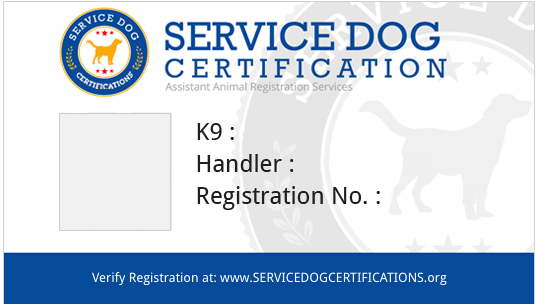Home Page › Blog › Registration Requirements: Service Dog – Certification
Registration Requirements: Service Dog – Certification

Any dog lover will tell you that the benefits of sharing your life with a canine companion are far too numerous to name. For people afflicted with certain disabilities and conditions, those benefits reach even further. Thanks to the American with Disabilities Act (ADA) of 1990, service dogs are so much more than just pets. These faithful companions provide the support needed by many individuals to live independently. From seeing eye dogs that are trained to guide the blind, dogs that can detect seizures before they strike and warn their owners, and canines that can sense their handlers’ blood sugar levels to highly trained dogs that help their owners perform numerous day-to-day tasks and those that aid soldiers who have returned from war, there is no limit to the types of roles these incredible dogs can fill.
How exactly does one go about registering a service dog? Let’s take a closer look at service dog registration requirements.
- Understand what a service dog is and what it does.
- Train the dog to provide a service for the handler/owner.
- Register your dog with a reputable organization.
- Get your service dog ID card and vest.
- Know your rights.

What Is a Service Dog?
A service dog is a dog that has been specifically trained to perform certain tasks or do work for someone with a disability. Some of the most common tasks including guiding the blind, alerting deaf people, protecting someone who is having a seizure, pulling a wheelchair, and reminding someone to take prescribed medications. Under the ADA, in order for a dog to qualify as a service animal, it must undergo extensive training to meet the specific needs of a person who is disabled. They are classified as working animals rather than pets, and they are afforded several protections under the law.
Training Requirements
Training is what distinguishes a pet from a service animal. Whether you have your dog professionally trained or choose to do the training yourself, you can register him or her as a service dog upon completion. The United States does not have guidelines in place for how much time you need to spend training a service dog, however, international standards recommend roughly 120 over the course of six months. Many dogs spend one to two years in training, and at least 30 hours should be spent training in public to help the dog learn how to work in distracting situations.
Once you feel that the dog has been thoroughly trained, you need to put him to the test. The Public Access Test provides evaluation criteria for service dogs. In order to pass, the service animal must not show aggressive behavior or beg for food or affection while being tested. The animal must also remain calm and avoid hyperactivity while in public and respond to basic obedience cues.
Registration and Equipment
In the United States, service dog registration is not required by law. However, registering your dog makes it much easier to ensure that your rights will be respected by businesses, landlords, etc. Registering your service dog online is easy and takes just a few minutes. Simply enter your name, your dog’s name, your email address and the type of service your dog performs.
Once your dog has been registered, it is a good idea to invest in certain equipment. While service dog identification is not required by law in the US, carrying a service dog ID card for your service animal could help you avoid some sticky situations. Service dog vests are also a good idea as they clearly show that your dog is working.
Service Dog Rights

Trained service dogs are afforded several rights under the ADA. They are allowed to enter public places where pets are not allowed, such as restaurants, malls, and hotels. Service dogs are also permitted to accompany their handlers on airplanes. Businesses may ask if a dog is a service dog and what tasks the dog performs. They may not, however, ask about the handler’s disability, require special identification for the dog or refuse admittance. Businesses that prepare or serve food must allow service dogs in public areas. The ADA supersedes local and state health codes.
If a service animal is out of the owner’s control and posting a direct threat to the safety and health of others, the business owner does reserve the right to ask the owner to remove the animal from the premises.
Once a service dog has been properly trained, registration is easy. Service dogs are largely self-regulated in the United States, and while federal law protects them and their owners, the requirements are much less rigid than many people would imagine. While identification and vests are not required by federal law, these things are recommended because they may make dealing with the public easier when you have a service animal.
About the Author: The writing team at Service Dog Certifications is made up of folks who really know their stuff when it comes to disability laws and assistance animals. Many of our writers and editors have service dogs themselves and share insights from their own experiences. All of us have a passion for disability rights and animals.
104 comments
Leave a Reply Cancel reply
Latest Posts

How to Bring a Service Dog to Disneyland
Trained service dogs are more than welcome to join their handlers at Disneyland. In this guide, we’ll explain Disneyland’s policies and give practical advice for bringing a service dog to Disneyland for the first time. Disneyland’s Service Dog Policies The Magic Kingdom is happy to welcome trained service dogs across most park locations! They kindly […]

Read More

Can Dogs Eat Tomatoes?
Yes! Dogs can safely enjoy tomatoes, but there are a few risks to be aware of so you can feed your dog responsibly. Fully ripe tomatoes (without the stems and leaves) can actually have nutrients that are good for your pup. Tomatoes have chlorogenic acid, an antioxidant that can have anti-inflammatory effects in cells. They’re […]

Read More

Can a Primary Care Doctor Write an ESA Letter?
Your family doctor, also called a primary care physician (PCP), can write a letter recommending an emotional support animal. We’ll explain what legally gives them that ability and explore what better options might be available for you. Why are Physicians Able to Write an ESA Letter? To turn your pet into an emotional support animal, […]

Read More







.Please address people putting there dogs in shopping carts in grocery stores . It scares the hell out of me when they jump out and land wrong. I don’t know what service they can perform from a grocery cart. And I have seen little dogs soil carts where people put there food and the “responsible” owners just leave it. There are transplant patients and other conditions who need to be careful with food prep. They love dogs too. But have to manage grooming , pest , and skin conditions of their pets . A true service dog and most esds would have all these addressed But we have all seen that one ungroomed dog running back and forth in a cart
At a pet supply store or hardware if you want to chance your dog sailing out of a cart that’s your right it won’t hurt anyone else until it happens
My dog rides in the cart. I also carry a blanket so he is on his blanket. He alerts for my diabetes and migraines. My hand is always on him.
I have PTSD and can not go out without him with me.
My dog is better behaved than most kids that are running and screaming in the store.
I have seen people aka ups driver take his dog to a place where food is served and claimed he was a service animal. One dose a service animal have to be with the owner all the time? Two should people that claim their dog is a service animal should they be charged with a crime? The use of a pet and to call it a service animal only hurts the people that need a service animal. Dose a Dr have to send a request for someone to get a service animal or can people just say I need a service animal?
I have a 5 pound chihuahua. She is emotional, therapy support dog. I take her in busy stores and in traffic to get her use to people. I’ve never had a chihuahua that go crazy if someone would come near me. She doesn’t bark, loves everyone. She hasn’t been trained for one I can’t afford it. She is carried in her bag or I’m holding her. I usually ask if she can come in. McDonald’s in my town says no and Kentucky Fried Chicken yes. McDonald’s in another town said yes.. My pastor ask me does she let me know blood pressure, diabetic, seizures. I told him she’s not that kind. She calms me. My therapist said he’d write something to let him know I need her. I know this is long but it bothers me..
An emotional support animal and a therapy dog are two different things. Neither of them have rights under the ADA to be in places that do not allow pets.
Your therapist can write a note to keep your dog if you live in ‘no pets’ housing, but cannot write anything that would allow you to have your dog in stores and restaurants that prohibit pets.
See: https://www.ada.gov/service_animals_2010.htm
I have PTSD, Type 2 Diabetic to name a couple of things. I am nervous in public and rarely leave my home to do anything. I have read that service dogs are in the $20k to $30k range. How does one begin the process to qualify for a service dog and is this something I can work out with with the VA?
I am just now starting to research. I am not sure I would qualify.
We train service dogs professionally at a greatly reduced rate from other companies that train. If anyone on here would like more information or is still looking for a service dog or trainer please contact us! We would love to help and answer any questions you may have. We are open to pretty much any situation and pretty much anywhere. We have multiple years of experience in training service dogs for many different disabilities and we are here to help people find the correct way to get a service dog. Email: K9_OnDemand@aol.com Phone: (425)-269-2165 call or text.
I have several illness concerns, does anyone know how to train my pocket Beagle to alert on my extreme high blood pressure? I was thinking about trying her on my diabetics or seizures to see where she would be a better fit, but my BP is the scarier of the three plus issues. I also an trying to find a proper trainer that may be willing to help me train, I am disabled so yep nit a lot of money either……I am so new at all of this. My one daughter did the fake service animal just so they could take their dog anywhere and everywhere……not proud of that at all! Any suggestions would be so very greatly appreciated!!
Danyelle
training is something you do everyday for the rest of the animals life. I have seizures. Everyday i am able to work on something with here.